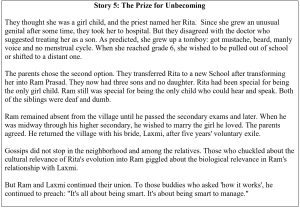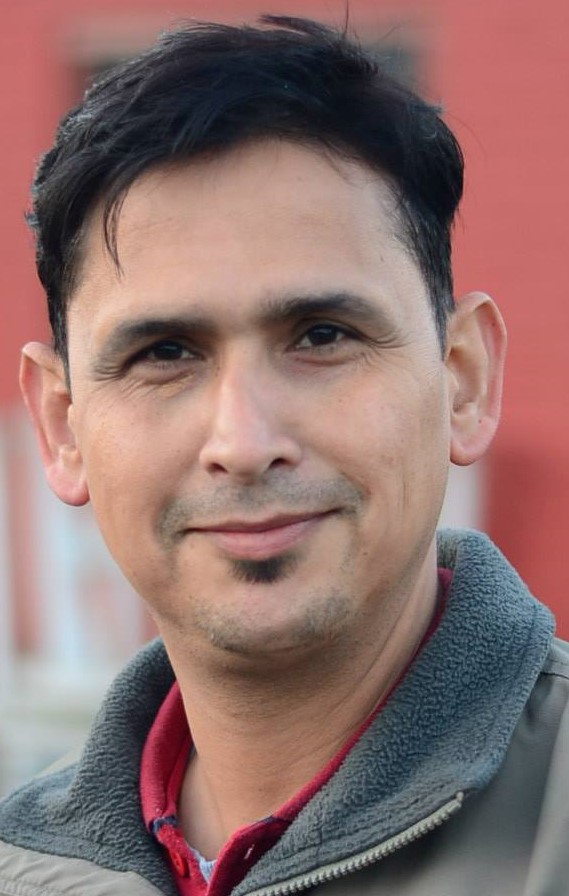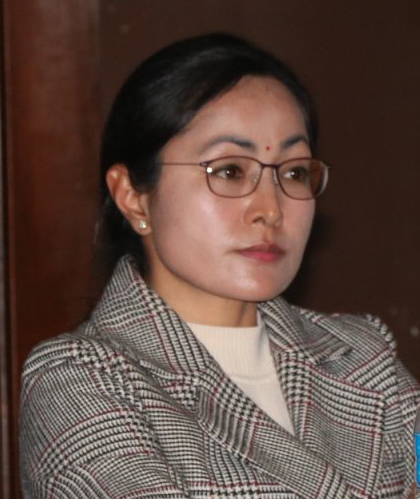A Conversation with Prof. Bivek Baral
– Anusha Gyawali, Shephalika Dhakal and Saugat Bastola
How was your journey as a student?
I was an above-average student during my school. I was more interested in developing my general knowledge than deeply burying myself in the textbooks only. Apart from interest in science, I had interest in paleoanthropology, anthropology, history, and culture. I enjoyed my primary and secondary school days with a number of achievements in academics, quiz contests, debate competitions, and sports. Happy schooldays also had some exceptions of nasty incidents, with one of the notorious teachers of mathematics whose severe corporal punishment led me to lose my interest in the subject. It took very long to regain my interest in that very important subject. This incident made me realize that if a teacher is not good enough, a student goes through what I had experienced. After I overcame the mental trauma, I was a fine student again.
Is there something you wish you knew when you started college?
When I started studying at KU, I was almost halfway to my Bachelor of Commerce degree. Soon after I completed my ISC, there were no other options to study engineering except in Pulchowk Campus, which had B.E. program in civil engineering only. Another option was to go to India to study other streams in engineering. But I was in a great dilemma whether to go there or not. Before deciding about joining KU or even knowing about the engineering program offered by KU, I was studying BCom in Biratnagar with the advice of my friends, to ultimately become a chartered accountant. I didn’t know about KU. The condition at that time was not as today. Newspaper was the only way to know about admissions notice. The first batch had already been enrolled when I came to know about KU and I decided to continue BCom. However, somehow, I knew that I was not born to be a CA as my deep interest was to pursue my career in engineering or architecture. Basically, since I was a late starter at KU, I had enough consideration about my future career, studying at KU was a well-thought thing.
Do you consider any of your teachers as your mentor? Could you share one memorable experience with that person?
I consider my mother with my father in the background as my mentor. She gave me various books — widely available and inexpensive Russian translated books on literature, astronomy, and anthropology. Generally, mothers are the first mentors for everyone. However, whatever character I have and whatever knowledge I have today on various subjects is due to her persuasion to read.
Among many, one whom I consider my school-time mentor, was Jibanath Dhamala. It was he who nurtured my interest in general knowledge and trained me to become a quiz master of Biratnagar. I remember an incident in class 6 when he guided our team to compete in a quiz contest with various schools and clubs of the Eastern Region. We were the winner despite being the youngest lads. I saw in his eyes the sparkle of happiness and satisfaction. He was happier than all of us in the team. In building my overall personality, he provided me with the first stepping-stone.
What/Who inspired you to become a better version of yourself? In what ways has he or she helped you?
Even after my undergraduate studies, I was a passive person, without a strong ambition for my future career and studies. We had a teacher duo of Chemistry in KU at that time, Durga P Acharya and Rupak Aryal. Durga sir was my teacher during my first year and Rupak was a senior. Both of them had a very strong urge for academic enhancement. They would constantly remind me to aim high and try for further studies. At that time my horizon or wish to study was limited to getting admitted to a good engineering institute in India. They however constantly motivated me to look beyond and persuaded me to apply to the University of Tokyo, which was among world’s top 10 universities. Rupak provided me with all the academic materials to write a competitive proposal for the application. I worked hard and was successful in obtaining the prestigious Monbukagakusho scholarship to study at the University of Tokyo. I think this to be the biggest turning point in my life. I started believing in myself and started believing that hard work is the only key to success. Had I not had the duo’s motivation, I wouldn’t have been where I am now.
Could you tell us about any incident that led you to choose a specific direction in life? Were there any mentors involved in the decision-making process?
I would like to again mention the duo for creating such an important transition in my life. I was an engineering student of the second batch of a newly established university. The university, with all sorts of limitations in engineering education, tried to provide us with the knowledge that it could. I did not have enough confidence to compete with the graduates of other countries. I used to think that the world had gone much higher in the field. But the duo always encouraged me to dream higher and go for it. “It would be great if you go to some technologically advanced country, learn and serve your nation with the learnings after you return.” I still remember these words which actually forged a turning phase in my life.
A teacher, a professor, PhD Supervisor or whatever I am today, I do consider myself being a blueprint of Professor Robert Raine, who was my Guru in New Zealand. By seeing him, I came to realize what an ideal teacher is like. I tend to motivate my students the way he motivated me and also nurture the strengths the way he did mine. It is obvious that a student may not perform well every time. Even in such situations, he never lost his patience. He used to consider every work of mine as our work. His behavior directed me to make my personality even stronger.
What is the role/impact of the first few batches in the growth and establishment of academic programs in a university? What is your observation about Mechanical Engineering in particular, and other engineering programs in general?
In KU there was a trend to hire young faculties amongst its own graduates. There were and are many faculties who studied undergraduate in KU. All of them contributed their heart and sweat to uplift the quality of education in KU, expand physical infrastructure and introduce new undergraduate and postgraduate programs. Mechanical Engineering faculties including myself, Sunil Lohani, Biraj Singh Thapa were from the pioneer batches. We, along with other faculties who joined in later years, have been continuously associated with the department since graduation and working our best to provide quality education in mechanical engineering. There are similar examples in other departments as well. However, the instance of contribution of mechanical engineering graduates of KU is highly significant.
In those years the students used to sense some paucity, the paucity of infrastructures in KU in comparison to those of Pulchowk Campus. Though there was not a huge difference in time of establishment of the mechanical labs in these two organizations, the lab at Pulchowk was much more advanced. To make up for the shortage, the way the alumni contributed was very appreciable.
What first got you into the teaching profession? Did your passion for teaching change over time?
During my final year of undergraduate studies, I started thinking about my career and prospective direction. My teachers, Bhola Thapa and Brijesh Adhikari, suggested that I think about my career in academia and motivated me to apply to KU after my graduation. Teaching, which needed constant learning, was my passion. It was my passion then and my passion has not changed at all over time. It has rather got stronger. My passion always makes me work hard when I teach or supervise and I am always motivated to motivate the prospective engineers.
Do you try to connect with every student you teach? How do you assess the students that require the most attention?
I do try to connect with every student in many possible ways; that is by knowing them with their names, their academic performances, their strengths and weaknesses. I refer to their past academic records and accounts from their previous lecturers. This enables me to adopt certain methods in teaching and mentoring which makes them perform better. I try to personally connect to each individual possibly. I provide them with my contact information, so that they can connect with me when they need my guidance. Without making them feel that I am giving them more attention because of their weakness, I try to approach them.
How much do you value relationships with your students and what part of it do you value the most?
I greatly value the relationship with the students. Afterall we are under the same professional fraternity. The only difference will be that of the number of years of experience. I feel that there are always human values in any relationship. It is also true about teachers and students. In my relationship with the students I emphasize mutual trust, respect, affection, care, guidance and gratitude.
What is the best part of mentoring?
Mentorship is needed basically for your own better version. Good mentorship is that if you are good at something, you will be better at that. Seeing any individual I mentored, at a level uplifting and being capable on their own, provides me an immense satisfaction. Once, a student used to score rather low grades. I tried and was able to motivate him enough. Surprisingly, he secured very good marks in my subject and later did great in other subjects as well. When the mentorship you provide reflects through the increased capability of the mentee, it is the best part of mentoring.
Do you have a favorite success story for one of your students?
There are a lot of them, actually. I had a student who now runs manufacturing industry. His company has been recently involved in the construction of hydro mechanical system of hydropower projects of 5- 20 MW capacity. There are more than a few of these examples.
But the most memorable one was a student who went to the US for higher studies. After his graduation he applied for a job there and then gave me a call after he got it. He thanked me because, apparently, the things he was asked in the job interview was mostly what he had learnt in the bachelor’s level. He said he just recalled it from when I taught him and answered those questions. It felt like a precious reward for my work when a student I had taught 5-6 years ago remembered me and my lecture which was very useful to him to secure the job.
As a hostel warden, you might have had opportunities to connect with students in a much deeper level. Can you share with us any mentorship roles you performed while you were the warden of the KU boys’ hostel?
I was actually not a good mentor as a warden. The reason might be that I myself was very young at the time. The hostellers were young, too. In those days, being a good hostel warden was all about being strict. I didn’t have much experience either. I wasn’t really aware of the whole concept of mentorship. I did fulfill my responsibilities, but in hindsight, I could have done so much better.
I think I need to admit that I did the job just for the sake of doing it. I couldn’t do any noteworthy work in terms of mentorship. But I didn’t know any better.
“University now and then”: will you comment on this based on your perception, struggles, and experiences?
Our university has definitely grown in terms of infrastructure, number of students and programs There’s no doubt about it. But I feel that much of the growth is only in the “hardware” part. The “software” part of the university is still the same old version. The attitude towards academics hasn’t improved in a way it should. It might sound harsh but it is the truth.
In 2004, there was a university in Bhutan that had just started running an engineering program. In 2013, they came to KU to learn the experience of KU in engineering education. They wanted to know how we grew over the years. Recently, in February, I went to the same university and taught there for about a month. I can say from what I saw that they have been doing better by their commitment and focus on technical education. The quality of delivery in KU hasn’t changed as much as it should have considering the amount of resources available at present. We still have a lot of room for improvement.
How are you different from or similar to your mentors?
When I was doing my masters in Japan, I had the opportunity of working with a mentor. But I didn’t really adopt much of that mentorship experience in my methods because mentorship there is still authoritative. It was mostly about following instructions and there was hardly any practice of arguing with anything the mentor said.
In New Zealand, however, it was completely different. My mentor was a graduate of one of the most prestigious universities of England, and it totally reflected on his mentorship approach. He always motivated me and taught me to highlight my strengths. He asked me to believe in myself. Whenever I said something based on some other references, he always nudged me to develop my own opinion on the matter. And when I showed some reluctance, he constantly reminded me to believe in myself. He gave me confidence and my method of mentoring at present is mostly based on that experience.
Do you have something you wish you had done differently?
Not really. I am satisfied with everything I did. Everything has come to me at the right time. I don’t really have much regret about what I did or didn’t do. I am happy with everything that happened and where it has led me to.
In your point of view, what might be the attributes to become a mentor?
Speaking from my experience, the connection between mentor and mentee should be the key attribute. The mentor has to be a professional, but he or she also should be able to maintain a human connection with the mentee.
This should be better in the context of Nepal because our culture itself considers that human factor. For an ideal mentorship, the connection is the key part. There is a saying that ‘Ph.D. is like a marriage’.
Apart from this, a mentor should be able to highlight the mentee’s strengths. Rather than just criticizing the mistakes and failures, a mentor should focus on a motivating environment.
So, yes, the key attributes for me as a mentor would be the ability to maintain a good connection with the mentee, highlight his strengths, and motivate them.
How does the work environment affect mentorship?
The work environment has major effects on the whole mentorship process. If I were in a better environment, I feel that I would have been more creative in the way I mentor my students. The connection is simple. If I am motivated, I will be able to motivate others better.
As a good mentor, the pressure and limitations I have must not reflect on my behavior towards the student. There is that part as well. But the work environment, definitely, shapes the mentorship ability.
Currently, I am in a position where I also have to, in a way, advocate the management’s roles and responsibilities in making a better work environment to the leaders of this University. I do this as the member of the University Senate. Once the working environment becomes better, it will resonate to the lowest level. I will be better able to motivate my students and they will also benefit directly.
Mentors don’t have to be necessarily a best friend, parent, or coach. What is your point of view in the statement? Can anyone be a mentor?
As I have already said before, I see my mother as a mentor. She laid the foundation of my interest in various subjects. But not only friends or teachers, anyone can be your mentor.
Rupak Aryal, the one I mentioned before as well, was a chemistry teacher. I was a mechanical engineering student. So, there was no link in our career path. Yet during our commute to university, we found a way to speak and connect with each other. He had a positive mindset. As he was senior to me, he used to share his experiences regarding his career. The things he said have influenced me and the path I choose in many different ways.
So, yes, your mentors need not necessarily be a parent or a teacher or a friend.
Mentors, or authority holders in general, are sometimes misunderstood by the students. Do you agree with this? Are there any incidences that come to your mind when you try to comply with this statement?
Yes, I do have experience regarding this. I recall a particular incident during my tenure at SWC. As you are familiar, there is a lot of student politics in the SWC. A student from environmental science was a bit of a hardliner. He mistook the suggestions I gave him and even threatened me. I was also a bit dissatisfied, but I didn’t lose my composure. I simply told him that he would not understand the things I am saying but, in the future, once he gains the experience, he will subscribe to what I was talking about then. Not so long ago, I met him in a forum and he was apologetic about that incident.
I don’t have these kinds of experiences with students of mechanical engineering because they are like junior colleagues and friends to me. As a teacher, there will be some disagreements. Sometimes, I might be hard on them, some other times a student might argue with me. These are part of the learning and mentorship process. I normally don’t even remember these arguments let alone hold a grudge against any students.



